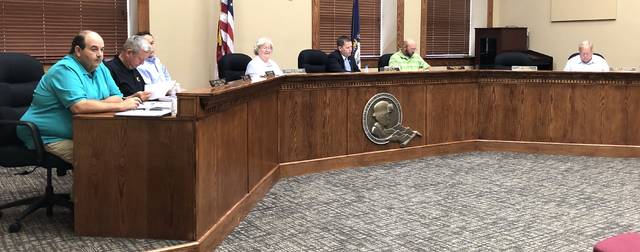Harmon releases Harlan County Fiscal Court audit
Published 11:37 pm Monday, June 28, 2021

Emily Perkins | Harlan Enterprise
Blackjewel miners will be able to attend a job fair slated for Aug. 1 as discussed during the Harlan County Fiscal Court regular meeting on Tuesday. The job fair will be from 10 a.m. to 3 p.m. in the Harlan Courthouse.
|
Getting your Trinity Audio player ready...
|
From the Office of Auditor Mike Harmon
State Auditor Mike Harmon has released the audit of the financial statement of the Harlan County Fiscal Court for the fiscal year ended June 30, 2019. State law requires annual audits of county fiscal courts.
Auditing standards require the auditor’s letter to communicate whether the financial statement presents fairly the receipts, disbursements, and changes in fund balances of the Harlan County Fiscal Court in accordance with accounting principles generally accepted in the United States of America. The fiscal court’s financial statement did not follow this format. However, the fiscal court’s financial statement is fairly presented in conformity with the regulatory basis of accounting, which is an acceptable reporting methodology. This reporting methodology is followed for 115 of 120 fiscal court audits in Kentucky.
As part of the audit process, the auditor must comment on noncompliance with laws, regulations, contracts, and grants. The auditor must also comment on material weaknesses involving internal control over financial operations and reporting.
The audit contains the following comments:
The Harlan County Fiscal Court does not have sufficient internal controls over waste removal collections: This is a repeat finding and was included in the prior year audit report as Finding 2018-001. The Harlan County Fiscal Court has failed to implement controls to ensure compliance with requirements of the Solid Waste Franchise Renewal Agreement. The following controls were not in place for Fiscal Year 2019:
- The fiscal court does not have written agreements with districts for garbage collections.
- The fiscal court does not receive delinquent list for all outstanding collections.
- The fiscal court does not receive sufficient documentation of garbage fees collected by all the utility districts.
As of June 30, 2019, the fiscal court is aware of at least $506,932 in accounts receivables for collection of residential and commercial solid waste throughout Harlan County. Utility districts do not provide monthly collection reports or lists of delinquent residents to the fiscal court. As such, the fiscal court cannot verify the amount of gross residential garbage removal fees collected by the districts or the amount of garbage removal fees remitted to the fiscal court. The lack of delinquent lists prevents the fiscal court from effectively monitoring uncollected revenues. Also, the fiscal court cannot provide a listing of delinquent residential customers to the company with the solid waste franchise.
The Harlan County Fiscal Court collects fees for garbage collections as allowed by KRS 109.056(2) and has chosen to collect these fees under the provisions of KRS 109.056(3). KRS 109.056(3) states the fiscal court, “may enter into an agreement with other utilities either public or private to collect such charges.” Good internal controls require these agreements be in writing to provide all parties with the terms of the agreements. These written agreements should also include the supporting documentation to be provided to the fiscal court by third parties for fees collected and delinquent. In addition, the Solid Waste Franchise Renewal Agreement requires the fiscal court to provide quarterly to company with solid waste franchise with a list of residential customers with delinquent accounts that are subject to having pickup services terminated.
We recommend the fiscal court enter into written agreements with the utility districts detailing recordkeeping requirements for waste collections, monthly financial reports, and delinquent listings. When procedures are implemented to create a list of delinquent customers, the fiscal court should provide the listing to the county attorney for potential collection efforts and company with the solid waste franchise for potential termination of services, as necessary.
County Judge/Executive’s Response: From January 2015 through June 30, 2019, nearly $5.9 million has been paid to the fiscal court for garbage service. From the reports that we receive from the districts, it is our belief that $578,401 is outstanding/delinquent as of June 30, 2019. From the reports that we do receive, this places the county at over a 91% collection rate. We realize we can’t truly calculate the collection rate with the information we receive, but with the limited information we receive from the districts, we believe this to be in line with other collection services, and consider it to be a good collection rate and a tremendous improvement from several years ago when it was below 50%. The court has worked with the County Attorney and the districts to prepare a written agreement and enter into a contract with all districts for garbage collections. Some districts have signed and returned the agreement, while some have not. The court has also been working with the County’s District Court in resolving delinquent matters and have been successful in the cases that have been presented to date.
The Harlan County Fiscal Court did not present all debt activity in the financial statement: The Harlan County Fiscal Court’s fourth quarter financial report did not include the financial activity for two refinanced loans, causing the sinking fund to exceed the debt service line item budget.
The Harlan County Fiscal Court refinanced two bonds which were used to finance the construction of sewer and waterlines, in order to save the county money through lower interest rates. The refinancing proceeds went directly from lessor to the vendor and were not reported on the fiscal court’s financial statement. Since these transactions did not run through the fiscal court’s bank accounts, they were not included in the fiscal court’s budget process or reflected on the fiscal court’s financial statement.
Failure to include all debt activity on the financial statement caused the financial statement to be understated by $5,214,514. After the financial statement was adjusted to properly account for the debt, the county’s budget to actual statement presented as supplementary information accompanying the financial statement shows the debt service line in the sinking fund to be under budgeted by $5,214,514.
The Department for Local Government’s (DLG) County Budget Preparation and State Local Finance Officer Policy Manual provides requirements and guidance for county government’s preparation and presentation of the financial statement and budget. Page 48 of the manual states, “[a]ll borrowed money received and repaid must be reflected in the county budget,” page 72 of the manual states, “[a]ll county money is to be reported on the financial statement whether it is included in the budget or not,” and page 74 of the manual states, “[a]ny borrowed money that is not reflected in the original budget estimate must be amended into the budget and be properly reflected on the financial report as a receipt as well as an “expenditure” for repayment of borrowed funds.” Good internal controls dictate that all debt activity be included in the financial statement in order to present an accurate financial picture of the fiscal court.
We recommend the Harlan County Fiscal Court present all financial activity in the county’s financial statement as required by the regulatory basis of accounting. In addition to complying with DLG’s financial statement presentation requirements, this will also ensure all line items are properly budgeted or amended as needed.
County Judge/Executive’s Response: The county refinanced two bonds to reduce interest paid over the life of these two bonds. This refinance will save taxpayers of Harlan County around $625,000 over the life of the loan. This transaction was not included in the budget because no funds were received by the Fiscal Court or County Treasurer, nor did the Fiscal Court or County Treasurer issue any payments associated with this refinance. All financial transactions occurred between the financial institutions involved and no funds flowed through any county bank accounts, as the comment stated. The County did reflect in the debt section of the financial statements a zero balance on the two refinanced bonds, along with the new debt issued and the amount. The County did budget for the repayment of these bonds, which is the only transaction that flowed through any county maintained bank accounts and the budget. Going forward, the county will include any debt as a budget line item to ensure they are included in the revenues and expenditures portion of the financial statement, even in instances like this one, where no funds flow through the county treasury.
The audit report can be found on the auditor’s website.





